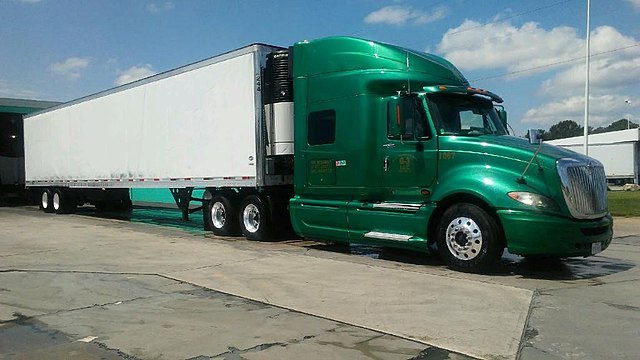Reefer trucks, short for refrigerated trucks, are a cornerstone of modern logistics. These temperature-controlled vehicles transport perishable goods like food, pharmaceuticals, and other temperature-sensitive items while maintaining their quality and safety.
In this article, we’ll explore the technology behind reefer trucks, their role in the supply chain, and the benefits they offer to businesses relying on the safe transportation of temperature-sensitive cargo.
What Are Reefer Trucks?
Reefer trucks are specialized vehicles equipped with refrigeration units designed to maintain a specific temperature range within their cargo space. These trucks are essential for industries that require strict temperature controls, such as:
- Food and Beverages: To prevent spoilage of fresh produce, dairy, meat, and seafood.
- Pharmaceuticals: For safely transporting vaccines, medicines, and other temperature-sensitive drugs.
- Flowers and Plants: To maintain freshness during transit.
The technology in reefer trucks ensures that products arrive in optimal condition, regardless of the weather or travel distance.
The Technology Behind Reefer Trucks
Reefer trucks combine advanced refrigeration systems with robust insulation to keep the cargo area at a consistent temperature. Key components include:
- Refrigeration Unit: Powered by either the truck’s engine or an independent power source, these units cool the cargo area.
- Thermal Insulation: High-quality insulation materials minimize temperature fluctuations by reducing heat transfer.
- Temperature Monitoring Systems: Advanced sensors continuously track the internal temperature, ensuring it stays within the desired range.
- Airflow Systems: Uniform airflow prevents hot or cold spots, maintaining consistent conditions throughout the cargo.
These features allow reefer trucks to handle temperature-sensitive goods with precision and reliability.
How Reefer Trucks Ensure Cargo Freshness and Safety
The primary goal of reefer trucks is to protect cargo from spoilage or contamination during transit. They achieve this through:
- Precise Temperature Control: Reefer trucks can maintain temperatures from -20°F (-29°C) to 75°F (24°C), accommodating a wide range of products.
- Humidity Regulation: Adjustable humidity levels prevent goods like fruits and vegetables from drying out or becoming overly moist.
- Pre-Cooling: Many reefer trucks pre-cool the cargo area to the required temperature before loading, ensuring immediate protection for the goods.
- Sanitation Standards: Reefer trucks are designed for easy cleaning, reducing the risk of cross-contamination.
These measures ensure that perishable items remain safe and meet industry standards throughout the transportation process.
Industries That Rely on Reefer Trucks
Several industries depend on reefer trucks to maintain the quality and safety of their products:
- Food and Beverage Industry: Restaurants, grocery stores, and food manufacturers rely on reefer trucks to transport everything from fresh produce to frozen goods.
- Healthcare and Pharmaceuticals: Vaccines, biologics, and medications must be transported at precise temperatures to remain effective.
- Floral and Agricultural Products: Flowers, plants, and seeds require specific conditions to stay fresh during transit.
- Cosmetics: Certain beauty products, like serums and creams, need controlled temperatures to prevent degradation.
Reefer trucks provide the temperature stability these industries need to meet consumer and regulatory expectations.
Benefits of Using Reefer Trucks
Partnering with reefer trucking services offers several advantages:
Extended Shelf Life
By maintaining the optimal temperature, reefer trucks preserve the freshness of perishable items, reducing waste and extending shelf life.
Compliance with Regulations
Many industries face strict regulations for transporting temperature-sensitive goods. Reefer trucks ensure compliance with standards like the Food Safety Modernization Act (FSMA) and Good Distribution Practices (GDP).
Flexibility in Transportation
Reefer trucks can transport a diverse range of goods, making them versatile solutions for businesses with varied shipping needs.
Real-Time Monitoring
Advanced tracking and monitoring systems provide visibility into the cargo’s condition during transit, giving businesses peace of mind.
Reduced Risk of Spoilage
With precise control over temperature and humidity, reefer trucks significantly reduce the risk of spoilage, protecting valuable shipments.
Challenges Faced by Reefer Trucking
While reefer trucks offer numerous benefits, they also come with challenges:
- High Operating Costs: Refrigeration units consume significant fuel, increasing operational expenses.
- Maintenance Requirements: Regular servicing of refrigeration systems is necessary to ensure optimal performance.
- Stringent Regulations: Compliance with food safety and transportation laws requires meticulous documentation and operational standards.
Despite these challenges, the demand for reefer trucking continues to grow due to its vital role in global supply chains.
Innovations in Reefer Trucking
The reefer trucking industry is evolving with advancements aimed at improving efficiency and sustainability:
Electric and Hybrid Refrigeration Units
Electric-powered refrigeration systems reduce fuel consumption and emissions, aligning with environmental goals.
Data-Driven Logistics
IoT-enabled sensors provide real-time data on temperature, humidity, and cargo conditions, enabling proactive issue resolution.
Autonomous Reefer Trucks
Self-driving reefer trucks are being developed to enhance delivery speed and reduce labor costs.
Solar-Powered Systems
Some reefer trucks now integrate solar panels to power refrigeration units, further reducing environmental impact.
These innovations demonstrate the industry’s commitment to sustainability and efficiency.
Tips for Choosing the Right Reefer Trucking Service
To ensure your cargo stays fresh and safe, select a reefer trucking service that meets your needs:
- Check Experience and Reputation: Choose a provider with a proven track record in transporting temperature-sensitive goods.
- Verify Compliance: Ensure the company adheres to all relevant regulations and standards.
- Assess Technology: Look for advanced tracking and monitoring systems that provide visibility into your shipment.
- Inspect Fleet Quality: Modern, well-maintained trucks are crucial for reliable service.
- Evaluate Customer Support: Responsive and knowledgeable support teams can address any concerns promptly.
Partnering with the right reefer trucking service can make a significant difference in the quality of your goods upon arrival.
The Future of Reefer Trucking
As consumer demand for fresh and high-quality goods rises, the reefer trucking industry will continue to innovate. Future trends include:
- Increased Use of AI: Artificial intelligence will optimize route planning and cargo management.
- Enhanced Sustainability Efforts: Expect more widespread adoption of green technologies, like electric trucks and biofuels.
- Expansion of Cold Chain Networks: Growing global trade will drive investments in cold chain infrastructure.
These developments promise a more efficient and eco-friendly reefer trucking industry.
Conclusion
Reefer trucks are indispensable for transporting perishable goods safely and efficiently. Their ability to maintain precise temperature and humidity conditions ensures the freshness and quality of cargo, benefiting industries ranging from food to pharmaceuticals.
As technology and sustainability efforts continue to advance, reefer trucking is poised to meet the evolving demands of global commerce. For businesses that depend on temperature-sensitive shipments, partnering with a reliable reefer trucking service is not just a choice—it’s a necessity.
Invest in reefer trucking today to keep your cargo fresh, safe, and ready to meet the needs of your customers.

